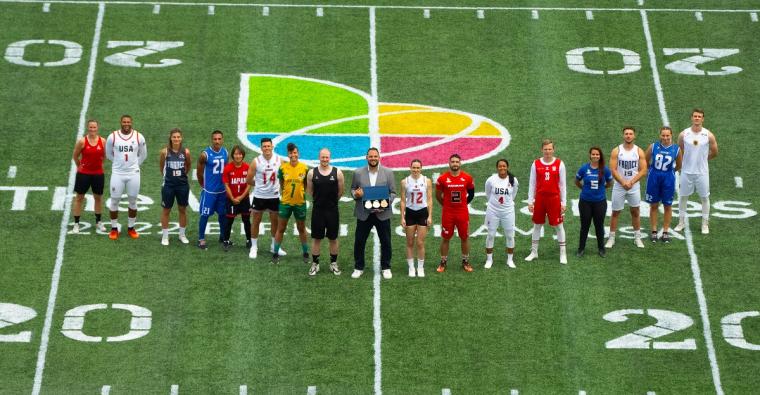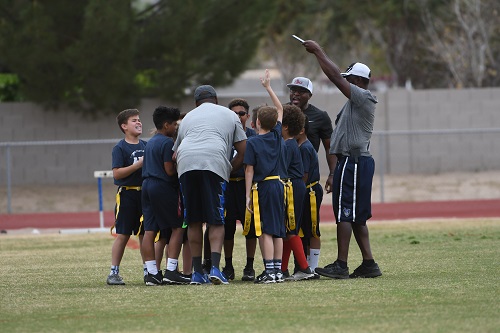
The International Association of American Football chose a high-visibility podium to make the announcement about flag football’s 2028 Olympic ambitions: the World Games, where the sport had just reached an enormous global audience.
The World Games featured 16 men’s and women’s teams competing on Birmingham’s iconic Legion Field. It marked the first time flag football had been included on the official program of the global multi-sport event and also marked a landmark moment in the development of the sport. The USMNT won gold over Italy, 46-36, while the USWNT took the silver, dropping the final to Mexico, 6-39.
Pierre Trochet, President of the International Federation of American Football (IFAF) and Troy Vincent, Executive Vice President of Football Operations of the National Football League (NFL) will co-chair the new “Vision28” Group that is expected to lead flag football’s efforts towards inclusion at Olympic Games Los Angeles 2028.
Although the announcement in Birmingham wasn’t the first time flag football has talked about its Olympic aspirations, this marked the first time it had put a date to them.

But it won’t be easy. The IOC has already stated that surfing, sport climbing and skateboarding are to be included. And with perhaps one or two spots available, competition is expected to be fierce.
The number of showcase sports to be added is a moving target; whereas in Tokyo, five new sports were showcased; in Paris, only four will be. Additionally, the IOC has already stated that surfing, sport climbing and skateboarding will be showcase sports in the 2028 Games, using up a few slots in advance.
Something else that could hurt flag football is its numbers. The International Olympic Committee (IOC) has a stated aim of limiting the number of athletes at the Summer Games to approximately 10,500. Team sports are more challenging to add, as they bring, obviously, more athletes.
Another hurdle: Even if flag football is included in the 2028 Games, it will be a showcase sport, the way baseball and softball were in Tokyo. Showcase sports are temporary sports; they are not permanent additions to the Olympic lineup. Because showcase sports are selected by the host city in consultation with the IOC, there is no guarantee they will be continued by the next organization. (It’s why baseball and softball were seen in Tokyo but won’t be seen in Paris, for example, but breakdancing will. Expect the host of the 2032 Games to make their own determinations as well).
Something flag football does have in its favor is a youthful following in both genders; the NFL FLAG efforts have been incredibly fruitful at the youth level and the game is gaining traction, particularly as concussion awareness rises. The IOC has long been in favor of sports with a strong youth base, as well as those that are contested by both genders.
IFAF has seen steady growth of flag over the past few years, with the 2021 Flag Football World Championships seeing the largest number of participating teams ever – 42. The sport is also growing wildly at the college level; NAIA labeled it an emerging sport for women, and the organization recently crowned its first champion. And to get a younger demographic, Nike is partnering with the NFL to drive girls’ participation.
The field is getting crowded with other hopefuls as well:
Baseball and Softball: The two sports (which lobby together as Baseball/Softball) made an appearance in Tokyo but will be absent from Paris (where neither sport has any kind of a following to speak of). Expect this to be a formidable lobby for 2028.
Lacrosse: The sport has a North American pedigree (it originated with the native Americans) and has continued to grow, being popular at the youth, high school and college level, as well as in the indoor arena. After being featured in the World Games as well, this sport will likely be pushing for a place in Los Angeles.
Cheer: A sport that originated in the U.S. and is contested worldwide, cheer is now a full member of the IOC. USA Cheer has a national team that competes in ICU events. USA sent a cheer squad to the Olympics in PyeongChang, so the sport has actually seen a form of Olympic representation. It too is hoping to be in Los Angeles.
Karate: Like baseball and softball, karate was shut out of 2024 – but unlike baseball and softball, its inclusion in 2028 is far from certain. However, the WKF isn’t giving up easily either, and has launched a campaign to try to keep interest in the sport front and center.
Then there were the other sports that were unsuccessfully campaigning for inclusion in the 2024 Games and whose international governing bodies will work to secure placement in 2028:
Squash: Always a bridesmaid and never a bride? Squash has been there, done that. Squash is the bridesmaid in the bubble-gum-pink taffeta dress and the dyed-to-match shoes, clutching her silk bouquet and grinding her teeth while listening to Karen Carpenter warbling “White Lace and Promises” while the bride and groom circle the dance floor. And 2024 was her fourth time as an also-ran, having been rejected for London 2012, Rio 2016, Tokyo 2020 and Paris 2024.
Flying Disc: This one flew (heh) under the radar – something that might have been part of the problem. Flying disc, which is governed by the World Flying Disc Federation, is contested in multiple formats and disciplines, including Ultimate, Accuracy, Freestyle, Disc Golf, Discathon, Distance, Double Disc Court (DDC) and Self-Caught Flight (SCF). Thanks to college club-level participation in Ultimate and growing disc golf nationwide, there is an awareness of disc sports in the U.S., so it may well have a chance.
Bowling: Bowling also failed to make the cut for Paris but is reportedly gunning for inclusion in Los Angeles. If there are adequate facilities to host worldwide competition already in existence in L.A. (meaning nothing new would have to be built), this could be a point in the sport's favor.
Teqball: A new sport that looks like a hybrid of soccer, table tennis and volleyball, teqball has stated its intention of campaigning for inclusion in the L.A. Games. However, the sport does not have a very high profile in the U.S. presently.
Cricket has announced it will campaign for ia place in LA28; however, its chances may not be as strong, given the fact that the U.S. has never qualified for a cricket World Cup. Its venues would also have to be purpose-built, and could not be reused for any other sport at the Games, something the IOC frowns upon.
These were just a few of the contenders. And to be fair, the Olympics have almost always attracted proposals from any number of sports. For example, for 2020, the proposals came from baseball and softball, karate, squash, bowling, snooker, sport climbing, surfing, wushu, roller sports, air sports, American football, bowls, bridge, chess, dance sport, floorball, flying disc, korfball, netball, orienteering, polo, racquetball, sumo, tug of war, underwater sports and water skiing. (Let the Googling begin). In fact, only seven IOC-recognized sports did not apply for 2020 inclusion: climbing and mountaineering, motorcycling, motor racing, cricket, basque pelota, lifesaving and powerboating.
Following review, the enormous list of applicants was reduced to eight sports: baseball and softball, bowling, karate, roller sports (which morphed into skateboarding), sport climbing, squash, surfing and wushu. In the final analysis, squash, wushu and bowling failed to make the cut.
The IOC actually recognizes an enormous number of sports federations; however, acceptance by the IOC in no way guarantees a sport placement in the Olympics. (If it did, the Olympics would be much longer (possibly by months), and would include sports like bridge and underwater shooting). Without a doubt, all sports have strong lobbies and all have their fans.
The last time American Football (as it is known on the international level) was in the Games was 1932 when it was a demonstration sport – once and once only.

